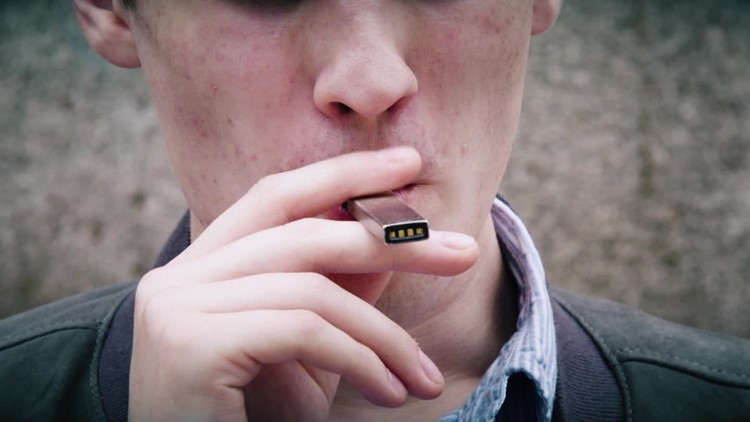Leading e-cigarette company Juul Labs has tried to distance itself from a vast social media presence that experts say drives its popularity among teens. But a CNN investigation sheds new light on how the company was encouraging — and at times paying for — social media users to promote its nicotine-filled product to thousands of their followers.
One of these users was Brooklyn-based Christina Zayas, 36, who has made a full-time career out of being a social media “influencer” since 2015: reviewing products, posing for photos and injecting her own brand of style and whimsy into her blog posts.
“Brands were eventually saying, ‘We have a budget. Would you be interested in doing this for money?’ ” Zayas told CNN.
In September 2017, she was invited to a campaign featuring Juul. The email, which she shared with CNN, came from an influencer marketing firm called Lumanu, with which she’d worked on other social media campaigns. A representative asked her to try Juul’s “premium e-cigarette and share your experience on your blog,” saying it was an opportunity to work together “over several months.”
“They liked my edgy style and that I appealed to the younger market,” Zayas said.
Zayas, who had been an occasional cigarette smoker, hadn’t had a good experience with e-cigarettes in the past but found the Juul easier to use, and she liked the flavors. She had tried it a week before Lumanu contacted her — coincidentally, she said.
“When Juul reached out to me at first, I was a little hesitant because even though it’s my brand, I do what I want with it,” she added. “Am I going to get backlash because I’m talking about smoking?”
After the campaign, she was paid $1,000 for one blog post and one Instagram post, she said. The Instagram post from November 2017 reached more than 4,500 people and garnered roughly 1,500 likes, according to metrics she shared with CNN.
The response was positive. “This sounds fun,” one user commented. “You make smoking look so good,” wrote another.
Health experts have slammed the company’s marketing tactics as following in the footsteps of Big Tobacco, which aimed advertising at young people in an effort to gain lifelong customers. Now, in the era of social media and its heavy teen presence, those same experts worry that e-cigarettes could put kids’ developing brains at risk, get them hooked on nicotine early in life and be a gateway to smoking and other drugs.
Juul Labs spokeswoman Victoria Davis told CNN in an emailed statement that it ended its influencer program “earlier this year.” She added that the “paid influencer program, which was never formalized, was short-lived” and involved “fewer than 10 paid influencers, who were all smokers or former smokers” 28 and up, and who were collectively paid less than $10,000.
Davis said that the influencers “had age appropriate audiences (21+).” Zayas, whose posts are publicly visible, shared with CNN that 5% of her current Instagram audience are 13 to 17, though the majority are 18 to 35.
An application site inviting users to “Join the JUUL Influencers” is no longer active, Davis said, “and the initiative is not moving forward.”
Juul also had an “affiliate program,” which offered commissions for purchases made through referral links on websites and social media. Davis said that program included “less than 20 active affiliates” as of September 2018, the month before it ended.
The company ended that program on October 31, according to an email shared with CNN by Vapor Vanity, a website that posts reviews and information about e-cigarettes. In the email, a member of Juul’s affiliate marketing team said that the program was “on hold indefinitely until further notice” and that the company would “continue to evaluate the program.”
Though Davis said the influencer and affiliate programs were small, critics argue that the even small amounts of Juul-related content are able to spread widely on the internet.
“Social media works differently than other stuff. You don’t need that many people,” said Matthew L. Myers, president of the Campaign for Tobacco-Free Kids. “A small number of people who are popular and get reposted can reach a very large number of people.”
For example, a study in May found that seven Instagram accounts posting droves of Juul-related content, only one of which belonged to the company, collectively had “amassed over a quarter million followers.” The other six accounts, which were later removed, were “created by a commercial entity that would benefit from higher sales of JUUL,” said study author Jidong Huang, associate professor at Georgia State University’s School of Public Health.
Davis said none of the accounts in the study were part of Juul’s affiliate program. And Juul worked with social media platforms to get these accounts taken down, she added.
In June, Juul said in a statement that it has “a dedicated internal team focused on reporting inappropriate content to social media companies,” such as third-party accounts that use the Juul name to sell products to underage users.
In addition, Davis noted that the company had phased out much of its US-based social media, shutting down its Facebook and Instagram feeds in November and scaling back its use of Twitter and YouTube.
Dr. Robert Jackler, founder of the Stanford Research into the Impact of Tobacco Advertising, told CNN it’s a “good thing” that the company had cut down its social media in the US.
“However, it’s very late in the game,” he said.



